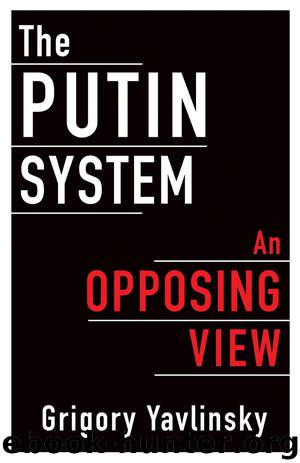The Putin System: An Opposing View by Grigory Yavlinsky

Author:Grigory Yavlinsky
Language: eng
Format: epub
Tags: History, Russia & the Former Soviet Union, Political Science, World, Russian & Former Soviet Union
Publisher: Columbia University Press
Published: 2019-02-19T00:00:00+00:00
THE SOCIAL BASE OF PUTIN’S POWER
Another important feature of a peripheral-type autocracy is the distinctive configuration of its social base of support. But before undertaking a description and analysis of this support, I have to make another digression. When speaking of “peripheral” authoritarianism, I am aware that, at this point in history, all countries ruled by authoritarian regimes are located, one way or another, on the periphery of global capitalism, whereas the political systems of the countries included in capitalism’s core are currently functioning on the basis of political competition. Granted, the framework of this competition may differ from one time and place to another, but in none of these countries is there a truly monopolistic grip on power by a fairly small group of people, as is typical in autocracies. Perhaps in this sense one can say that, at least at this time, there is no other type of authoritarianism than the one that exists on the periphery of the world system.
And yet I believe that identifying peripheral authoritarianism as an autonomous phenomenon is worthwhile, in terms of analyzing its characteristics in Russia. There are at least two rationales for this. First, the concept of world periphery is fairly elastic and covers economies and societies that differ widely from one another in terms of their complexity and degrees of modernization. Coincidentally, those authors who use the term “peripheral economy” in their works point to significant differences in the economies and the social structures of the countries included in this category, and they introduce the notion of “semiperipheral” countries and economies.10
Accordingly, individual countries with authoritarian or similar political systems, while being part of the overall world periphery, are positioned at considerably different places with regard to the core of the world economy. Thus, on the one hand, there are quite a few dictatorial regimes that are parasitizing on a primitive, often seminatural and monocultural economy in the countries that lag behind the leaders of modern capitalism at a distance of one or even two historical periods. On the other hand, many countries that have been in the process of making or have already completed their historic leap toward the core of industrial civilization and are positioned on its borderline continue to maintain political systems in which the principles of free political competition operate on a very limited basis, if at all. Specific examples may include Singapore, Indonesia, oil kingdoms in the Middle East, and, finally, mainland China, with its one-party system and tight control over political developments. In these countries, some form of political authoritarianism coexists with quite modern forms of entrepreneurship and with high levels of education among a significant part of society, which is also highly receptive to new technologically advanced business.
Another reason to analyze Russia in terms of peripheral authoritarianism is that the trajectory of the political systems of even the most developed countries of the world—from their emergence to their present-day, competition-based polities—passed through some form of autocratic rule. And the autocratic periods in their histories are not that far removed from our times.
Download
This site does not store any files on its server. We only index and link to content provided by other sites. Please contact the content providers to delete copyright contents if any and email us, we'll remove relevant links or contents immediately.
| Arms Control | Diplomacy |
| Security | Trades & Tariffs |
| Treaties | African |
| Asian | Australian & Oceanian |
| Canadian | Caribbean & Latin American |
| European | Middle Eastern |
| Russian & Former Soviet Union |
The Secret History by Donna Tartt(19017)
The Social Justice Warrior Handbook by Lisa De Pasquale(12182)
Thirteen Reasons Why by Jay Asher(8880)
This Is How You Lose Her by Junot Diaz(6868)
Weapons of Math Destruction by Cathy O'Neil(6257)
Zero to One by Peter Thiel(5778)
Beartown by Fredrik Backman(5726)
The Myth of the Strong Leader by Archie Brown(5490)
The Fire Next Time by James Baldwin(5421)
How Democracies Die by Steven Levitsky & Daniel Ziblatt(5207)
Promise Me, Dad by Joe Biden(5138)
Stone's Rules by Roger Stone(5073)
A Higher Loyalty: Truth, Lies, and Leadership by James Comey(4944)
100 Deadly Skills by Clint Emerson(4909)
Rise and Kill First by Ronen Bergman(4767)
Secrecy World by Jake Bernstein(4735)
The David Icke Guide to the Global Conspiracy (and how to end it) by David Icke(4694)
The Farm by Tom Rob Smith(4498)
The Doomsday Machine by Daniel Ellsberg(4479)
